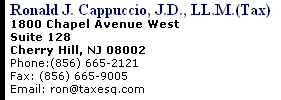
An Idea to Factor In
When You Need Funds |
For many growing companies, a large percentage
of working capital is tied up in accounts receivable. Some
businesses that extend credit have as much as 20 percent of
their annual sales outstanding. Of course, receivables help to
grow your company's balance sheet but they're not much use
when you need money.
One way to get a quick infusion of cash is to
turn to a little-known service called "factoring." With this
|
Count
the Benefits |
|
o
An immediate cash flow increase.
o The ability
to meet your bills and demands. You no longer have to
wait for invoices to be paid to increase production or
purchase inventory.
o The
possibility of reducing or abolishing your accounts
receivable department. This savings could more than
offset the fee charged by the factor firm.
o The
potential to eliminate the risks and expenses of bad
debt. (However, some factoring relationships are
established with only partial recourse.)
|
option, your company sells its
accounts receivable to a bank or financing firm and it assumes
the risk of collection.
The best
part: Your company gets
money almost immediately, within 24 hours in some cases.
Compare this with the 30 days or longer that your company
usually waits for customers to pay.
Factoring is not a new financing
technique. For those of you who are financial history
buffs, itís been around since the Mesopotamians came up with
the concept 4,000 years ago. The first widespread, documented
use of it in North America occurred in the American colonies
down south before the revolution.
In its modern
formulation, it works basically the same way
as accepting a credit card. Your company
receives the money right away and the factoring company
waits for payment.
Typically, the factoring company
pays your company an advance of between 70 percent and 90
percent of the face value of the invoices. When the customers
pay, the factoring company takes out its fee and pays your
company the balance.
The fees range from three per
cent to five per cent of the invoices, based on sales
volume, the creditworthiness of your customers and the average
invoice size. So factoring is more expensive than most other
forms of finance. But, your company saves by not having to do
the credit functions itself and if the money you
get brings in new business, it can be fairly easy to
justify the costs.
Moreover, you aren't adding debt or
diluting equity, and as your company's working
capital builds up, it can reduce the amount
it factors, carrying more of its own accounts and
eventually becoming completely
self-financing.
The process is especially
appealing to young and rapidly growing companies since it
shortens the cash cycle. Please call me at (856) 665-2121 or Email me to discuss
financing for your
business. |
Negotiating Bank Loan
Problems
Getting a
Bank Loan There are a couple of old
sayings that relate to getting a loan. One is that bankers only
want to lend money when you don't need it. However, you can change
the odds of getting cash when you need it by gaining a clearer
understanding of the lending process.

| 






















































